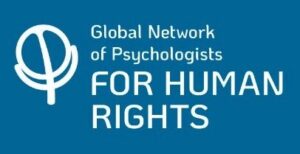Note from the Editors: The Bulletin of the Global Network of Psychologists for Human Rights (GNPHR) contains articles, events, news, and citations about domains where psychology and human rights intersect. Information is gathered from many sources and reflects many opinions. The goal is to stimulate reflection, discussion, and informed dialogue.The material published here does not imply that the GNPHR as a network, the GNPHR Steering Committee as a committee, or the individual subscribers share the expressed views.

May 2025
Table of Contents
SPECIAL COMMEMORATIVE DAYS – UN

International Day of Living Together in Peace, May 16
“In a world where conflicts are multiplying and polarizing ideas as much as societies, this Day reminds us that it is precisely when this horizon of peace seems distant that we must relentlessly build this ideal of concord and social cohesion.” Audrey Azoulay, UNESCO Director-General
Following the devastation of the Second World War, the United Nations was established to save succeeding generations from the scourge of war. One of its purposes is to achieve international cooperation in solving international problems, including by promoting and encouraging respect for human rights and for fundamental freedoms for all without distinction as to race, sex, language or religion.
In 1997, the General-Assembly proclaimed, by resolution 52/15, the year 2000 as the “International Year for a Culture of Peace.” In 1998, it proclaimed the period 2001-2010 as the “International Decade for a Culture of Peace and Non-Violence for Children of the World.”
In 1999, The General-Assembly adopted, by resolution 53/243, the Declaration and Programme of Action on a Culture of Peace, which serves as the universal mandate for the international community, particularly the United Nations system, to promote a culture of peace and non-violence that benefits all of humanity, including future generations.
The declaration came about as a result of the long-held and cherished concept — contained within the Constitution of UNESCO — that “since wars begin in the minds of men, it is in the minds of men that the defenses of peace must be constructed.” The Declaration embraces the principle that peace is not merely the absence of conflict, but also requires a positive, dynamic participatory process, in which dialogue is encouraged and conflicts are resolved in a spirit of mutual understanding and cooperation.
The Declaration also recognizes that to fulfil such an aspiration, there is a need to eliminate all forms of discrimination and intolerance, including those based on race, colour, sex, language, religion, political or other opinion, national, ethnic or social origin, property, disability, birth or other status.
From the UN website
Human Rights Education Association (HREA): The UN recognizes May 16 as the International Day of Living Together in Peace to promote peace, tolerance, inclusion, understanding and solidarity – both inside and across borders. Sustainable peace is possible only when human rights are respected.
The Day promotes reconciliation to help ensure peace and sustainable development, including through education, by working with communities, faith leaders and other relevant actors, through reconciliatory measures and acts of service, and be encouraging forgiveness and compassion among individuals.
HREA has over 20 resources addressing peace education, including lesson plans, toolkits, teacher training manuals and multimedia materials.
In preparation for educational activities for peace and throughout the year, you are welcome to explore HREA’s Online Resource Center for HRE resources on topics at the intersection human and children’s rights.
GNPHR NEWS AND EVENTS
GNPHR Blog explores psychology and climate justice
From Waste to Energy: Tapping into Our Power to Heal Our Planet. Dr. Anand Sathyanarayana, CEO and Owner of Geofluid Private Limited, Mumbai, India.
Polli Hagenaars receives Robert Roe Memorial Award
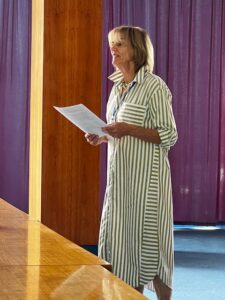 GNPHR Co-Chair Polli Hagenaars has been awarded the 2025 Robert Roe Memorial Award for making a difference to society. As the award announcment stated: “The Awarding Committee noted Polli Hagenaars’s exceptional contribution in positioning psychology as a leading voice for human rights and embedding these principles within the field. Through impactful research, advocacy, and leadership, she has united scholars and students across Europe, advanced public policy, and powerfully demonstrated psychology’s relevance to society.”
GNPHR Co-Chair Polli Hagenaars has been awarded the 2025 Robert Roe Memorial Award for making a difference to society. As the award announcment stated: “The Awarding Committee noted Polli Hagenaars’s exceptional contribution in positioning psychology as a leading voice for human rights and embedding these principles within the field. Through impactful research, advocacy, and leadership, she has united scholars and students across Europe, advanced public policy, and powerfully demonstrated psychology’s relevance to society.”
The award is presented every two years by the European Federation of Psychologists’ Associations (EFPA). GNPHR salutes Polli Hagenaars for her commitment, vision, and leadership.
Webinar Series Human Rights Education
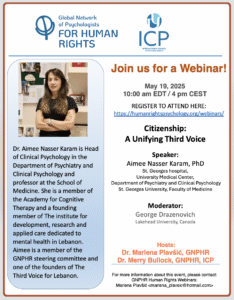 April Webinar:
April Webinar:
Next Webinar May 19, 2025
Citizenship: A Unifying Third Voice
10am EDT / 4 pm CET
Register Here
For past Webinars, see: https://humanrightspsychology.org/webinars/
CONTENT AREAS AND NEWS
Academic Freedom / Higher Education
Universities in Nazi Germany and the Soviet Union thought giving in to government demands would save their independence
Iveta Silova, The Conversation, April 9, 2025.
As a scholar of comparative and international education, I study how academic institutions respond to authoritarian pressure – across political systems, cultural contexts and historical moments. While some universities may believe that compliance with the administration will protect their funding and independence, a few historical parallels suggest otherwise.
German universities: A lesson
In the 1975 book “The Abuse of Learning: The Failure of German Universities,” historian Frederic Lilge chronicles how German universities, which entered the 20th century in a golden age of global intellectual influence, did not resist the Nazi regime but instead adapted to it. Professional associations, such as the Association of German Universities, stayed silent, ignoring key opportunities to resist before universities lost their autonomy and became subservient to the Nazi state. A few academics resisted and were dismissed, exiled or executed. Most did not. But what made Hitler’s orders stick was the eagerness of many academic leaders to comply, justify and normalize the new order. Each decision – each erased name, each revised syllabus, each closed program and department – was framed as necessary, even patriotic. Within a few years, German universities no longer served knowledge – they served power.
USSR and fascist Italy suffer similar fate
Other countries that have fallen under authoritarian regimes followed similar trajectories.
In fascist Italy, the shift began not with violence but with a signature. In 1931, the Mussolini regime required all university professors to swear an oath of loyalty to the state. Out of more than 1,200, only 12 refused. Many justified their compliance by insisting the oath had no bearing on their teaching or research. But by publicly affirming loyalty and offering no organized resistance, the academic community signaled its willingness to accommodate the regime. This lack of opposition allowed the fascist government to tighten control over universities and use them to advance its ideological agenda.
In the Soviet Union, this control was not limited to symbolic gestures – it reshaped the entire academic system.
After the Russian Revolution in 1917, the Bolsheviks oscillated between wanting to abolish universities as “feudal relics” and repurposing them to serve a socialist state, as historians John Connelly and Michael Grüttner explain in their book “Universities Under Dictatorship.”
When universities start regulating not just what they say but what they teach, support and stand for – driven by fear rather than principle – they are no longer just reacting to political threats, they are internalizing them. And as history has shown, that may mark the beginning of the end of their academic independence.
Amnesty International: Online harassment halts Filipino youth activists exercise of rights
John Sitchon, PHT Rappler, April 9, 2025
A report from global rights movement Amnesty International (AI) revealed that state-sponsored online harassment against young rights defenders in the Philippines has greatly deteriorated their capacity to seek legal remedies and exercise their own rights.
Released on April 4, 2025, the report, entitled, “Left to their own devices,” investigated the experiences of youth human rights defenders (YHRDs) who shared how online harassment had pushed them to minimize their online engagement with their advocacies, isolate themselves from social circles, and even opt out of reporting the harassment they face. Amnesty International’s first ever youth-led report reveals that online harassment by the Philippine authorities, including the practice of “red-tagging” or labelling individuals as communists, creates a climate of fear that is deterring young human rights defenders from engaging in activism and expressing themselves freely.
Media urged to promote academic freedom in universities
Raymond Appiah-Amponsah, Ghanaian Times, April 29, 2025.
The Regional Director of African Coalition for Academic Freedom (ACAF), Professor Appiagyei-Atua, has called on the media to promote and protect academic freedom in Ghanaian Universities. Academic freedom is a fundamental concept in higher education that enables scholars, researchers, and academia to discuss and disseminate information without any censorship. Speaking at a media-training workshop in Accra, Professor Appiagyei-Atua emphasised the importance of understanding academic freedom, a concept that was crucial for both academics and journalists.
Climate Justice
Posthumanism and Human Rights Psychology – Opportunities for Advancing Rights for Nonhumans
George Drazenovich & Mirella L Stroink, International Perspectives in Psychology 14(2):88-101, April 2025.
The planet’s ecological and environmental crisis is a pressing global challenge. We argue that the dual objectives of human rights and well-being for humans and rights for nonhumans involving prioritizing the natural ecological space, need not be seen as separate goals. Both can be achieved by building on a rights-based approach informed by the tradition of human rights. Rights for nonhumans are an extension of, and not a displacement for, the significant strides made in human rights since the Universal Declaration of Human Rights in 1948.
Data Rights
AI Human Rights Literacy
Saah Agyemang-Badu, Felisa Tibbitts, Sage Phillips, Current Issues in Comparative Education 26(2), March 2025.
The treatment of artificial intelligence (AI) in the field of education has so far been typically characterized by (a) information about how AI can assist educators in carrying out their work, and (b) concerns about the misuse of AI by learners, for example, concerning plagiarism. The links between AI and ethics within the field of education are much more complex. Beyond the concerns about the organization of teaching and learning with the rise of AI—and the associated rights to privacy and safety—there are legitimate needs for instructors and learners to understand how AI affects their daily lives. What are the wider ethical considerations for using AI, particularly from the perspective of human rights norms? This paper critically analyzes some of the human rights at stake regarding the use of AI and its implications for the organization and content of formal education (K-12 and higher education.
Decolonization / Indigenization
Advancing culturally competent medical education: decolonizing approaches to Indigenous health as a human rights imperative
Leblanc, J., Wesley, F., Drazenovich, G., Capon, P., Oyella, J., & Rainville, R. (2025). Critical Public Health, 35(1).
This paper advances decolonization within medical education, contextualized by the United Nations Declaration on the Rights of Indigenous Peoples (UNDRIP). We discuss, describe, and analyze the history of settler colonialism and its relevance for healthcare and education today. We analyze how Indigeneity is interpreted in an international context based on the United Nations Permanent Forum on Indigenous Issues. We situate the current health context in medical education based on data from global sources and the World Health Assembly’s advocacy for advancing Indigenous health equity internationally. As each university is responsible for engaging meaningfully with the First Nations upon whose traditional lands they occupy and using a case-based example of a university–tribal authority partnership, we describe models of culturally informed and community-driven medical education based on our experience.
Haiti’s independence ransom: Macron offers ‘truth’, Haitians want reparations
Benjamin Dodman, France24, April 2025.
French President Emmanuel Macron on Thursday said a joint commission of French and Haitian historians would investigate the legacy of the “heavy price” Haiti was made to pay for its independence, two centuries after France extracted a crippling indemnity from its former colony. His statement made no mention of Haitian demands for reparations for the ransom imposed on the first people in the modern world to free themselves from slavery. It should have been a joint quest for liberty, equality, fraternity. Instead, it was a history of vengeance, plunder and enduring injustice.
On April 17, 1825, Haitian President Jean-Pierre Boyer was coerced into accepting an indemnity of 150 million gold francs in exchange for French recognition of his country’s independence. © Wikimedia Creative Commons
Inclusion, Exclusion, Racism
Trump, Antisemitism, & Academia
Christopher R. Browning, The New York Review, April 10, 2025.
If the Trump administration were truly concerned about antisemitism, it would start in its own house.
In 2016 President Trump’s election campaign produced two notorious ads: one featuring Hillary Clinton against a background of hundred-dollar bills and a Star of David, and another promising protection against global special interests and featuring the portraits of three Jewish financiers, Janet Yellen, George Soros, and Lloyd Blankfein. Both ads were blatant renditions of the classic antisemitic smear of Jewish money and Jewish financiers as the sources of power behind an opponent. In August 2017, at the Unite the Right rally in Charlottesville, Virginia, demonstrators marched with swastika and Confederate flags in a Nazi-style torchlit parade, chanting the Nazi slogans “Blood and Soil” and “Jews will not replace us.” Responding to this incident, Trump found there to be “fine people” on “both sides.”
After the January 6, 2021, attack on the Capitol, which attempted to overturn the legal election of his opponent, Trump praised those sentenced and jailed as “political hostages” and “patriots.” He did not say whether those labels applied to the protesters wearing sweatshirts that said “CAMP AUSCHWITZ,” or those seen elsewhere wearing what seems to be the Proud Boy version, “6MWE” (6 Million Weren’t Enough). Since he had dinner at Mar-a-Lago in November 2022 with the self-proclaimed antisemite Kanye West and the leading Holocaust denier Nick Fuentes, Trump is apparently not disturbed by such company or sentiments.
Changing the Eurocentric narrative about the history of science – why multiculturalism matters
Karen K. Christensen-Dalsgaard, The Conversation, April 9, 2025.
A Eurocentric version of history
The story typically told in the West is that science was invented in ancient Greece and then, following close to a millennium of intellectual darkness, developed in Western Europe over the past 500 years.
Other cultures might have contributed a clever trick here or there, like inventing paper or creating our modern number system, but science as we know it was developed almost entirely by white men. As such it becomes a story of superiority, one that demands gratitude.
The scars of this way of thinking are all over our geopolitical landscape. It shapes how many western leaders interact with other cultures, apparently entitling them to share their intellectual authority without needing to listen to others. It is a mindset that belittles other civilizations and led to centuries of colonial violence.
This Eurocentric version of scientific history omits some of the most important events that shaped modern thinking. Science was not developed so much by individuals but by a highly complex global process that brought together ideas, lived experiences and approaches from all major civilizations.
Mental Health and Human Rights
Advancing global mental health diplomacy through a rights-based approach
Jakub S Bil, The Lancet,Volume 12, Issue 4, p247-249, April 2025.
Global mental health diplomacy must prioritise a human rights-based approach to integrate mental health into the international agenda through cooperation and advocacy. With over 75% of individuals with mental ill health in low-income and middle-income countries (LMICs) lacking access to care, immediate action is essential. Despite increasing recognition of mental health globally, the consistent application of a rights-based approach remains limited.
Mental health diplomacy is key to addressing these challenges by uniting governments, international organisations, the private sector, and civil society. By framing mental health as integral to global health, diplomacy can promote a rights-based approach, highlighting its impact on productivity and economic resilience. Additionally, mental health diplomacy must tackle the effects of climate change on mental health, emphasising mental health as a global public good aligned with the Sustainable Development Goals. This approach should include resource sharing, capacity building, and sustainable funding to support local, sustainable programmes.
The UN Convention on the Rights of Persons with Disabilities (CRPD) provides a framework for integrating human rights within mental health systems. WHO’s QualityRights programme, aligned with CRPD principles, promotes rights-based, community-focused mental healthcare in LMICs with limited resources. In India, QualityRights has reduced stigma and improved care quality, showing how CRPD-aligned frameworks can build resilience adapting to local needs.
Peace / Violence and War
Overcoming collective violence and increasing peaceful coexistence: Emotional and attitudinal effects of victims’ narratives
Castro-Abril, P., Basabe, N., Páez, D., López-López, W., Harizmendi, M., Telletxea, S., Pizarro, J., & Velásquez-Díaz, L. M. (2025) Peace and Conflict: Journal of Peace Psychology.
This study contributes to the growing body of work on intergroup forgiveness in contexts of collective violence. Through a novel approach, we have analyzed the impact of victim testimonies for the first time from an experimental approach and found them to be a particularly useful tool for intervening attitudes related to intergroup forgiveness. Furthermore, this study highlights the importance of including direct victims as moral exemplars in peacebuilding processes.
The scars of war last for centuries: how we understand collective trauma needs to change
Cindy C. Sangalang, Nature, May 12, 2025.
Researchers looking to study the social ramifications of mass traumas must not overlook the histories of affected communities in the search for healing.
In 2024, wars killed hundreds of thousands of people in Ukraine, Gaza, Sudan and beyond1. The United Nations refugee agency, UNHCR, reported that more than 122 million people remained displaced from their homes by violence and conflict in the first six months of last year — 5.3 million more than in the same period in 2023. These collective traumas can leave emotional scars that shape the health, relationships and life chances of those who experience them, as well as affecting their children and future generations.
Next, researchers should focus on communities to understand the ramifications of trauma fully and to mitigate its impacts better. So far, most studies on the impact of large-scale past traumas have focused on individual experiences — but this misses crucial context.
On the 80th anniversary of the bombing of Dresden, tributes to victims are hijacked by far right
Stéphanie Trouillard, FRANCE24, February 2025.
More than 25,000 people died during the Allied firebombing of the city of Dresden, Germany, from February 13 to 15, 1945. Eighty years later, thousands of people have linked hands to form a human chain in the city to pay tribute to the victims and to push back against right-wing extremists who use the anniversary to push their own revisionist agenda.
“The extreme right wants to argue that Dresden constitutes a war crime that far exceeds the destruction caused by Luftwaffe bombers and is ‘just as horrible’ as the atrocities committed at Auschwitz and other death camps.”
Women
UK’s first trans judge appeals to European court of human rights over supreme court ruling
Libby Brooks, The Guardian, 29 April 2025.
Victoria McCloud brings action against UK for infringement of her human rights after ruling on biological sex.
Britain’s first transgender judge is taking the UK to the European court of human rights over the supreme court’s ruling on biological sex. The UK supreme court ruled earlier this month that the terms “woman” and “sex” in the Equality Act referred only to a biological woman and to biological sex, with subsequent guidance from the equality watchdog amounting to a blanket ban on trans people using toilets and other services of the gender they identify as. Victoria McCloud, a retired judge, is applying to the European court of human rights to bring action against the UK for infringement of her article 6 rights. Article 6 of the European convention on human rights (ECHR) guarantees the right to a fair trial in both criminal and civil matters.
WHO issues new recommendations to end rising “medicalized” female genital mutilation and support survivors
Since 1990, the likelihood of a girl undergoing genital mutilation has decreased threefold. However, it remains common in some 30 countries around the world, and an estimated 4 million girls each year are still at risk.
The new WHO guideline, titled The prevention of female genital mutilation and clinical management of complications, provides recommendations to both prevent the practice and ensure evidence-based care for survivors, covering actions for the health sector, governments, and affected communities.
“Female genital mutilation is a severe violation of girls’ rights and critically endangers their health,” said Dr Pascale Allotey, WHO’s Director for Sexual and Reproductive Health and Research, and the United Nations’ Special Programme for Human Reproduction (HRP). “The health sector has an essential role in preventing FGM – health workers must be agents for change rather than perpetrators of this harmful practice, and must also provide high quality medical care for those suffering its effects.”
PUBLICATIONS
 World Report on Social Determinants of Heath Equity
World Report on Social Determinants of Heath Equity
A global report published by the World Health Organization (WHO) highlights that the underlying causes of ill health often stem from factors beyond the health sector, such as lack of quality housing, education and job opportunities.
The new World report on social determinants of health equity shows that such determinants can be responsible for a dramatic reduction of healthy life expectancy – sometimes by decades – in high- and low-income countries alike. For example, people in the country with the lowest life expectancy will, on average, live 33 years shorter than those born in the country with the highest life expectancy. The social determinants of health equity can influence people’s health outcomes more than genetic influences or access to health care.
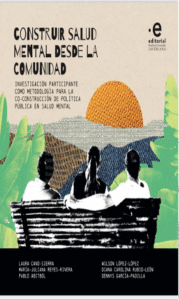
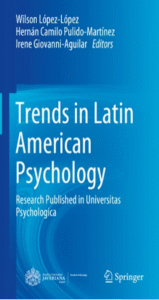
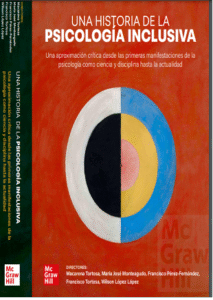
Three Significant Books: Construir Salud Mental desde la Comunidad[The Construction of Community Based Mental Health], Trends in Latin America, and Una Historia de la Psicologia Inclusiva[The History of Inclusive Psychology]
Wilson López López, Ph.D., Professor Pontificia Universidad Javeriana.
Construir Salud Mental desde la Comunidad is the result of the Montes de María project. This project focused on the communities of the Montes de María (indigenous peoples, Afro-descendants, campesinos, LGBTQ+ individuals, women, and health care workers). These communities have experienced and survived massacres, murders, and various forms of violence.
Trends in Latin American Psychology serves as a tribute to the journal, Universitas Psychologica, that became a prominent voice in the field of psychology in the Ibero-American region. The publishing house Springer proposed the publication of a book consisting primarily of Spanish contributions that had been translated into English.
Una Historia de la Psicologia Inclusiva, is a book on the history of Psychology with an editorial Magrawhil Spain, this book has an inclusive perspective. This book aims to be the basis of the history of psychology courses in Ibero-America.
 Children’s Rights-Based Indicators, Strengthening States accountability to children
Children’s Rights-Based Indicators, Strengthening States accountability to children
Ziba Vaghri, Roberta Ruggiero, Gerison Lansdown, Springer, Open Access, 2025.
Identifies the core indicators of each article in the UN Convention on the Rights of the Child. Provides a succinct overview of how to measure the implications of every CRC article in practical terms. Brings together research of international experts and consulting with almost 2,000 children from 35 countries. This book is open access.
 African Feminist Praxis. Cartographies of Liberatory Worldmaking
African Feminist Praxis. Cartographies of Liberatory Worldmaking
Jessica Horn, SAGE Publications.January 2025.
“Written in love and fire, African Feminist Praxis is meticulous and visionary.” – Dr. Pumla Dineo Gqola, SARChI Chair in African Feminist Imagination, Nelson Mandela University and author of Female Fear Factory. So much of the story of African resistance has been told in the masculine, tracing the history of spectacle: great struggles, great speeches, the grand displays of nation building. This book adds to the literature that reverses this, exploring the flesh and breadth of contemporary African feminist politics as articulated across the African continent. It is structured around the key principles of kinship, courage, pleasure, care and memory, and draws on the African feminist academic canon, the “grey literature” of practitioner knowledge and narratives of feminists activists themselves. Through this it evidences the argument that African feminist praxis is fundamentally a politics of proposition, a mode of liberatory worldmaking.
 Whiteness, Racial Trauma, and the University
Whiteness, Racial Trauma, and the University
Harshad Keval, Edinburgh Napier University, UK, SAGE Publications, January 2025.
Universities are regarded as safe havens for knowledge production and the educational transformation of lives. There is, however, a long history of universities as sites of contestation where structures of hierarchical legitimacy are played out.
In response to the upsurge in global protests against racial violence and the criticism of colonial, racialised and Eurocentric forms of thinking, universities have adopted new roles as ‘anti-racist’ and ‘decolonial’ beacons of hope. This book unravels how such liberal progressive ‘acts’ hide a much deeper racialised logic of whiteness-framed structural narcissism, producing insidiously powerful and difficult to trace forms of racialised harm.
 Slippery Eugenics: An Introduction to the Critical Studies of Race, Gender and Coloniality (Social Science for Social Justice) 1st Edition. R. Sánchez-Rivera , Sage, 2025.
Slippery Eugenics: An Introduction to the Critical Studies of Race, Gender and Coloniality (Social Science for Social Justice) 1st Edition. R. Sánchez-Rivera , Sage, 2025.
Discover the hidden legacy of eugenics and its enduring influence on modern policies and global society. Beginning with the origins of eugenics, Sánchez-Rivera traces the spread of eugenic ideas across different nations, revealing how they intersect with nationalism, populism and individual reproductive rights. Through a comprehensive exploration, this book uncovers how these intertwined legacies still shape our world today offering fresh insights into the subtle forces that define contemporary social and political landscapes, and have lasting impacts on reproductive control, racialization, colonialism, gender norms, and more.
 Guidance on mental health policy and strategic action plans: Module 1. Introduction, purpose and use of the guidance. WHO, March 2025.
Guidance on mental health policy and strategic action plans: Module 1. Introduction, purpose and use of the guidance. WHO, March 2025.
Momentum is growing globally for rights-based, person-centered, and recovery-oriented mental health policies and action plans, ensuring equitable access to quality services within Universal Health Coverage (UHC).
This publication provides a clear framework for strengthening leadership, governance, service delivery, and workforce capacity. It highlights mental health’s connection to social and structural determinants—such as poverty, housing, education, and employment—offering actionable strategies to address these, combat stigma and discrimination, and expand access to care. It emphasizes the crucial role of people with lived experience in shaping inclusive, responsive systems and advocates for cross-sector collaboration to deliver holistic support, integrating lifestyle, and physical health, psychological, social, and economic interventions while promoting well-being and prevention.
The Guidance comprises five modules.
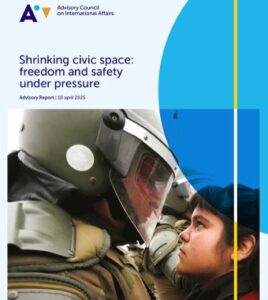 Shrinking civic space: freedom and safety under pressure. Advisory Report, 10 april 2025
Shrinking civic space: freedom and safety under pressure. Advisory Report, 10 april 2025
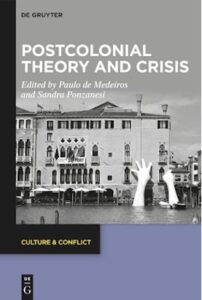 Postcolonial Theory and Crisis, Paulo de Medeiros and Sandra Ponzanes (eds.), De Gruyter, 2024 (Open Access).
Postcolonial Theory and Crisis, Paulo de Medeiros and Sandra Ponzanes (eds.), De Gruyter, 2024 (Open Access).
The volume aims at a conceptualisation of the relations between postcolonial theory and crisis, while also looking at the crisis of postcolonialism and the ways in which it can respond to contemporary issues. It seeks to understand, situate, and analyse postcolonial theory in the face of neo-liberalism, neo-imperialism, and neo-colonialism – the relation between ‘post’ and the increasing use of ‘neo’ is in itself part and parcel of the question.
OPPORTUNITIES
Call for Papers
Call for Papers: Understanding Stress and Stigma in Immigrant Communities. Special Issue of Translational Issues in Psychological Science. Deadline for Submissions: June 29, 2025.
Please feel free to forward this correspondence to interested colleagues and the psychologists in training with whom you work. Mare Meadows, Associate Publisher, Journals, American Psychological Association.
Guest Editor: Shu-Sha Angie Guan. https://www.apa.org/pubs/journals/tps
Awards
The International Council of Psychologists calls for nominations for the International Human Rights Award. Deadline: June 30, 2025
This award recognizes work being done by psychologists to advance human rights. The award is given to a psychologist or a group/organization largely composed of psychologists that has done substantial work to address human rights issues locally or globally through education, research, service or advocacy. Human rights are defined broadly and include social, cultural, economic, civil, and political rights.
UPCOMING EVENTS
Children’s rights and the future of the UN Treaty Body System. Lecture in hybrid mode on 13 June, 1.30-3.00 PM CET.
The lecture will be given by Dr. Philip Veerman, a distinguished figure in the field of children’s rights, will talk about “Children’s rights and the future of the UN Treaty Body System”. We invite students, researchers, practitioners and other interested persons to reflect critically on the current state of children’s rights and research. His lecture on 13 June will draw from this broad expertise, asking critical questions: What can be the direction of children’s rights in the light of the changing world order? What are the challenges?
This event promises to be a valuable opportunity for anyone engaged in the fields of human rights, childhood studies, social justice, or international development.
NARRATIVES OF CAPTIVITY: AN INTERDISCIPLINARY SYMPOSIUM, 18TH June 2025, Northumbria University Newcastle and online. Attendance is free of charge.
The Northumbria Centre for Evidence and Criminal Justice Studies, in association with the Crime Studies Network, is holding a one-day interdisciplinary symposium on Narratives of Captivity on Wednesday 18th June 2025. This will be a hybrid event, held on campus in central Newcastle and online.
We are interested in how literature, popular culture and law understand situations of loss of liberty or severely restricted freedom, including in the context of imprisonment, kidnapping, (irregular) migration (e.g. visa regimes, human trafficking or migrant smuggling) and coercive and controlling behaviour. In particular, we welcome papers which discuss how far individuals in situations of captivity are portrayed as retaining moral or legal responsibility for their actions, and on the parallels or contrasts between the depiction of ostensibly legitimate imprisonment and illegal forms of confinement. Contributions are welcome from any discipline including literature, history, philosophy, sociology, media studies, criminology and law. Attendance is free of charge.
More information: tony.ward /at/ northumbria.ac.uk
Extended Deadline – Call for Papers – 35th Meeting of the German Peace Psychology Association.
20-22 June 2025, Constructor University, Bremen, Germany. Keynotes: Dan Christie & Akuch Kuol Anyieth
“War again?” – We invite conceptual and empirical contributions from all disciplines represented in the broad field of peace psychology and neighbouring disciplines outside psychology, scholars at different career stages related to the conference theme, and others situated in peace psychology more broadly. Bachelor’s and Master’s theses are also expressly encouraged.
Translational Issues in Psychological Science is seeking submissions for a special issue on understanding stress and stigma in immigrant communities. The deadline for submissions is June 29, 2025.
Call for Papers: Understanding Stress and Stigma in Immigrant Communities. Special Issue of Translational Issues in Psychological Science. Deadline for Submissions: June 29, 2025.
Guest Editor: Shu-Sha Angie Guan. h
Convening the global sustainability community. 16–19 June 2025, Istanbul Congress Centre, Türkiye.
The Global Sustainable Development Congress brings together the world’s leading thinkers, policymakers and actors from different sectors to drive new alliances and create positive action for a more sustainable future. Over four days, keynote speakers, panellists and representatives from our track and global content partners will share their insights on health, sustainable cities, clean energy, AI, gender equality, the environment and much more.
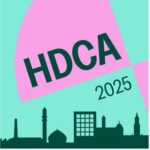 HDCA 2025 Conference. Culture, Peace and Capabilities.
HDCA 2025 Conference. Culture, Peace and Capabilities.
Hosted by the University of Bradford , September 1-5, 2025, Bradford, West Yorkshire, UK
The annual conference of the Human Development and Capability Association (HDCA) brings together people from all over the world from different disciplines and fields interested in human development and the capabilities approach. To register, please go to: https://hd-ca.org/hdca-conference-registration-2025. Early bird rates end after June 6.
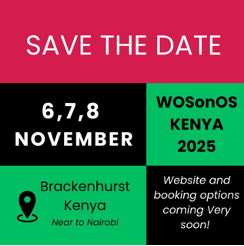 https://ilp.world/events/wosonos-2025
https://ilp.world/events/wosonos-2025
2nd Annual Conference of Human Dignity and Humiliation Studies
International Conference on Mental Health, Human Dignity, and Climate Change:
Mitigating Global Psychological Risk
Lahore, Pakistan and online
Monday – Tuesday, 27th – 28th October 2025: Dignilogues
Wednesday – Thursday, 29th – 30th October 2025: Academic Dignity Conference
Please visit this webpage regularly for the latest information, as plans for this conference unfold, If you wish to participate, please register here!
Please know that you are invited to spend the entire conference with us, so that true dignity-family-building can emerge! All our events are part of an ongoing effort to nurture a global dignity community.
There is no registration fee, we share minimal cost according to ability at the end.
18th European Public Health Conference
Helsinki, Finland
PRE-CONFERENCES 11 NOVEMBER 2025 MAIN CONFERENCE 12 – 14 NOVEMBER 2025
CONTACTS: Published by the Global Network of Psychologists for Human Rights – www.humanrightspsychology.org
Disclaimer: The website of the Global Network of Psychologists for Human Rights (GNPHR) contains articles, events and news about the domain where psychology and human rights intersect. The information presented in this Bulletin, does not imply that the GNPHR shares the views and beliefs in the articles.
- @GNPHR1
- How to get involved – read how you can contribute to the global network
- Consider contributing a Blog/Commentary
- News and Bulletins from the GNPHR – Subscribe to GNPHR
- Email addresses:
Ways to Participate in Global Network Activities
- Share Your Experiences and Examples
One of the best ways to illustrate the intersection of psychology and human rights is through example. We are looking for examples of your encounters with human rights issues in your professional life. You might describe a time when you protected (or failed to protect) human rights, or advocated for what you saw as a human rights issue. The events might be in your clinical, research, academic, applied, or volunteer work. Please send your narrative / story (500-1000 words) to Marlena Plavšić (marlena_plavsic@hotmail.com). We will compile these for publication in the GNPHR Bulletin and on the website. Please also indicate if you would like your stories to remain anonymous. - Share your Expertise and Opinions
We invite you to contribute a blog or opinion piece on general human rights issues; human rights education or strategies for raising the profile of human rights within psychology or your professional life. Students are welcome to contribute, including on student needs for learning about and addressing human rights. Please contact the GNPHR Blog editor (blogeditor@humanrightspsychology.org) with ideas for the article you would like to write! - Send articles/news/events
If you come across a human rights article or news, or know of an upcoming hunman rights event, please send for publication in the Bulletin. Send to the Bulletin editor Polli Hagenaars (polli.hagenaars@gmail.com).

